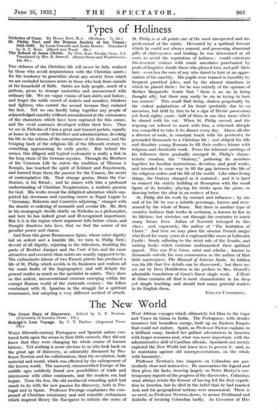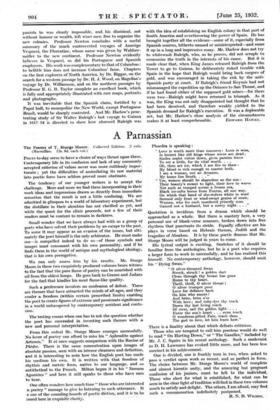The New World
The Great Days of Discovery. Edited by A. P. Newton. (University of London Press. 15s.)
WHEN fifteenth-century Portuguese and Spanish sailors ven- tured forth upon the ocean in their little caravels, they did not know that they were changing the whole course of human history. Yet nothing is more obvious to us who look back on the great age of discovery, so admirably discussed by Pro- fessor Newton and his collaborators, than the revolution, both material and moral, which was effected by the enlargement of the known world. The narrowly circumscribed Europe of the middle ages suddenly found new possibilities of trade and intercourse with other continents, and the modern era had begun. None the less, the old mediaeval crusading spirit had much to do with the new passion for discovery, both in Por- tugal and in Spain. Professor Prestage emphasizes the com- pound of Christian missionary zeal and scientific enthusiasm which inspired Henry the Navigator to initiate the series of
West African voyages which ultimately led Diaz to the Cape and Vasco da llama to India. The Portuguese, with slender resources but boundless energy, built up an Eastern Empire that could not endure. Spain, as Professor Pastor explains in a brilliant essay, backed her gallant adventurers in America with larger resources and, what was more important, with the administrative skill of Castilian officials. Spaniards not merely explored the New World but knew how to govern it—and, as he maintains against old misrepresentations, on the whole with humanity.
Professor Newton's two chapters on Columbus are par- ticularly clear and instructive. He summarizes the legend and then gives the facts, drawing largely on Peter Martyr's con- temporary reports of the progress of the discoveries. Columbus must always retain the honour of having led the first expedi- tion to America, but he died in the belief that he had reached Asia and his geographical notions were nonsensical. There is no need, as Professor Newton shows, to accuse Ferdinand and Isabella of treating Columbus badly. As Governor of His-
paniola he was clearly impossible, and, his dismissal, not -without honour or wealth, left wiser men free to organize the new . colonies. Professor Newton concludes with a useful suninuiry of the much controverted voyages of Amerigo Vespucci, the Florentine, whose name was given by Waldsee- nffiller to the new continent. Professor Newton evidently believes in 'Vespucci, as did his Portuguese and Spanish employers. His work was complementary to that of Columbus : to belittle him does not increase Columbus' fame. Chapters on the first explorers of North America, by Dr. Biggar, on the search for a western passage by Dr. H. J. Wood, on Magellan's voyage by Dr. Williamson, and on the northern passages by Professor E. G. R. Taylor complete an excellent book, which is fully and appropriately illustrated with rare maps, portraits and photographs,
It was inevitable that the Spanish claim, fortified by a Papal bull, to monopolize the New World, except Portuguese Brazil, Would be sharply contested. And Mr. Harlow's pene- trating study of Sir Walter Raleigh's last voyage to Guiana in iii-18 is directed to show how obsessed Raleigh was
with the idea of establishing an English colony in that part of South America and overthrowing the power of Spain. He has brought together all the evidence—some of it, especially from Spanish sources, hitherto unused or misinterpreted—and sums it up in a long and impressive essay. Mr. Harlow does not try to whitewash Raleigh, who, as he proves, did not scruple ta economize the truth in the interests of his cause. But it is made clear that, when King James released Raleigh from the Tower to go to Guiana, he deliberately risked trouble with Spain in the hope that Raleigh would bring back cargoes of gold, and was encouraged in taking the risk by the anti- Spanish party at court. If Raleigh's friend Keymis had not mismanaged the expedition up the Orinoco to San Thome, and if he had found either of the supposed gold mines—for there were two—Raleigh might have returned in triumph. As it
the King was not only disappointed but thought that he had been deceived, and therefore weakly yielded to the Spanish demand for Raleigh's execution. It was a deplorable act, but Mr. Harlow's close analysis of the circumstances
makes it at least comprehensible. EDWARD HAWKE.



































 Previous page
Previous page